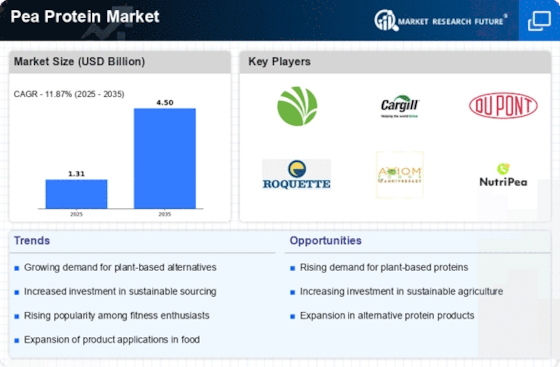Top Industry Leaders in the Pea Protein Market
 The Pea Protein Market has experienced substantial growth in recent years, driven by increasing consumer demand for plant-based protein alternatives. The competitive landscape of this market is dynamic, with key players employing various strategies to gain a foothold and secure market share. As of 2023, the Pea Protein Market is characterized by a mix of established companies and new entrants, each navigating the evolving landscape.
The Pea Protein Market has experienced substantial growth in recent years, driven by increasing consumer demand for plant-based protein alternatives. The competitive landscape of this market is dynamic, with key players employing various strategies to gain a foothold and secure market share. As of 2023, the Pea Protein Market is characterized by a mix of established companies and new entrants, each navigating the evolving landscape.
Key Players:
- A&B Ingredients,
- Axiom Foods Inc,
- Ingredion Corporation,
- Cosucra Groupe Warcoing,
- GEMEF Industries,
- Glanbia Plc,
- Green Labs,
- Roquette Frères,
- AGT Food and Ingredients,
- Yantai Shuangta Food Co. Ltd.
Strategies Adopted:
To maintain and enhance their positions, key players in the Pea Protein Market are employing strategic initiatives. One common strategy is product diversification, where companies expand their product portfolios to include various forms of pea protein, such as isolates, concentrates, and textured proteins. Additionally, partnerships and collaborations with food and beverage manufacturers are prevalent, enabling companies to integrate pea protein into a wide range of products and reach a broader consumer base. The emphasis on marketing and promotional activities to raise awareness about the benefits of pea protein is another notable strategy.
Factors for Market Share Analysis:
Market share analysis in the Pea Protein Market is influenced by several factors. Product quality, pricing strategies, distribution networks, and brand recognition are crucial determinants of market share. Companies offering high-quality pea protein with desirable functional properties are more likely to capture a larger market share. Effective pricing strategies that cater to different consumer segments also play a significant role. Furthermore, robust distribution networks and strong brand equity contribute to a company's ability to reach consumers and secure market share.
New and Emerging Companies:
While established players dominate, the Pea Protein Market is witnessing the emergence of new and innovative companies. These companies often focus on specific niches within the market, such as organic or non-GMO pea protein, catering to the preferences of health-conscious consumers. The entry of new companies introduces diversity and encourages competition, prompting established players to adapt to changing market dynamics.
Industry News and Current Companies:
Industry news and updates reflect the Pea Protein Market's responsiveness to consumer trends and regulatory developments. Companies regularly announce new product launches, certifications, and expansions to strengthen their market positions. For instance, Roquette Frères expanded its pea protein production capacity to meet the growing demand for plant-based protein alternatives. Such developments highlight the commitment of companies to address market needs and capitalize on emerging opportunities.
Investment Trends:
Investment trends in the Pea Protein Market are aligned with the increasing popularity of plant-based diets and the demand for sustainable protein sources. Companies are investing in research and development to enhance the functionality of pea protein and explore new applications. Additionally, there is a noticeable trend of investments in production facilities to scale up pea protein manufacturing capabilities, ensuring a stable supply to meet the rising demand. These investments underline the long-term commitment of companies to the pea protein market.
Overall Competitive Scenario:
The Pea Protein Market exhibits a competitive scenario where established players strive to maintain their dominance, while new entrants challenge the status quo by introducing innovative products. The overall landscape is characterized by a balance between large-scale production capabilities of key players and the agility of emerging companies to cater to specific market niches. This dynamic environment fosters innovation, price competition, and continuous improvement in product offerings.
Recent Development
In 2023, a noteworthy development in the Pea Protein Market was the increasing emphasis on sustainable sourcing and production practices. Key players, including The Scoular Company and Puris, announced initiatives to strengthen their sustainability efforts by sourcing peas from environmentally responsible suppliers and implementing eco-friendly production processes. This development reflects the industry's responsiveness to consumer concerns about the environmental impact of food production.
Furthermore, strategic collaborations between pea protein manufacturers and major food and beverage brands gained prominence in 2023. These collaborations aimed to create new plant-based products and capitalize on the growing trend of incorporating pea protein into mainstream food items. Such partnerships exemplify the market's evolution as pea protein transitions from a niche ingredient to a mainstream choice in the food and beverage industry.

- Beta
Beta feature










